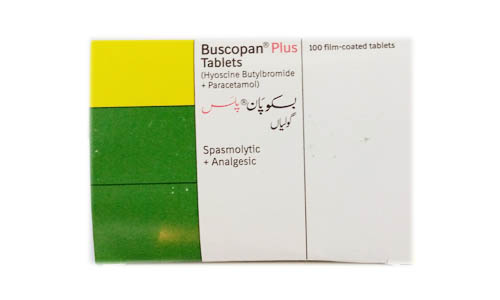BUSCOPAN 100s TABS
Irfan Traders exporter of Buscopan plus tabs at competitive and affordable rates. Buscopan tablets contain the active ingredient hyoscine butylbromide, which is a type of medicine called an antispasmodic. Buscopan is used to relieve colicky abdominal pain that is caused by painful spasms in the muscles of the gastro-intestinal (GI) or genito-urinary (GU) tract.
Description
BUSCOPAN DESCRIPTION
CONTENTS:
- Hyoscine-N-butylbromide
- Paracetamol
Description/ Action/ Indications and many more of Buscopan:
Excipients:
- microcrystalline cellulose
- sodium carboxymethylcellulose
- dried maize starch
- ethylcellulose
- colloidal silica
- hypromellose
- magnesium stearate
Action:
- Hyoscine-N-butylbromide, a known antispasmodic substance that relieves the pain by acting on the muscle spasm which causes the pain;
- Paracetamol which has analgesic properties. This special combination of Hyoscine-N-butylbromide + Paracetamol (Buscopan Plus) allows cramped muscles to relax and simultaneously delivers fast relief from pain
Indications/Uses:
Dosage/Direction for Use:
The total daily dose should not exceed 6 tablets & isn’t chewable
The film-coated tablets are not suitable for children under 10 years of age.
Overdosage:
- pallor
- nausea
- vomiting
- anorexia
- abdominal pain
Patients may then experience a temporary subjective improvement but mild abdominal pain possibly indicative of liver damage may persist.
A single dose of paracetamol of approximately 6 g or more in adults or 140 mg/kg in children may cause hepatocellular necrosis.
This may lead to complete irreversible necrosis and subsequently to hepatocellular insufficiency, metabolic acidosis and encephalopathy, which may in turn progress to coma and death.
Concurrent rises in liver transaminases (AST, ALT), lactate dehydrogenase and bilirubin and an increase in prothrombin time, occurring 12 – 48 hours after ingestion, have been observed.
Clinical symptoms of liver damage are normally apparent after 2 days and reach a maximum after 4-6 days,Acute renal failure with acute tubular necrosis may develop even in the absence of severe liver damage.
Treatment: If required, parasympathomimetic drugs should be administered.
Ophthalmological advice should be sought urgently in cases of glaucoma.
Cardiovascular complications should be treated according to usual therapeutic principles. In case of respiratory paralysis: intubation, artificial respiration should be considered.
Catherisation may be required for urinary retention.
Contraindications:
Use In Pregnancy & Lactation:
Long experience with the mono substances has shown insufficient evidence of adverse effects during human pregnancy.
During pregnancy, paracetamol should not be taken for prolonged periods, in high doses, or in combination with other medicinal products as the safety has not been confirmed in such cases.
Therefore, Hyoscine-N-butyl-bromide + Paracetamol (Buscopan Plus) is not recommended during pregnancy.
For Hyoscine butylbromide, safety during lactation has not yet been established. However, adverse effects on the newborn have not been reported.
Paracetamol enters breast milk, but is not likely to affect the infant when therapeutic doses are used.
No studies on the effects on human fertility have been conducted.
Side Effects:
Immune system disorders, skin and subcutaneous tissue disorders: Skin reactions, sweating abnormal, pruritus, urticaria, nausea, erythema, blood pressure decreased including shock, anaphylactic shock, anaphylactic reactions, drug eruption, dyspnoea, hypersensitivity, angioedema, rash, exanthema.
Very rare cases of serious skin reactions (such as Stevens-Johnson syndrome (SJS), toxic epidermal necrolysis (TEN) and acute generalized exanthematous pustulosis (AGEP) have been reported for paracetamol.
Cardiac disorders: Tachycardia.
Drug Interactions:
Long-term use of paracetamol in patients being treated with oral anti-coagulants is only advisable under medical supervision.
Concomitant use of paracetamol and zidovudine (AZT or retrovir) enhances the tendency towards reducing leukocytes (neutropenia). Therefore, Hyoscine-N-butylbromide + Paracetamol (Buscopan Plus) should only be taken together with zidovudine following medical advice.
The paracetamol dose should be reduced during concurrent administration with probenecid.
Cholestyramine reduces the absorption of paracetamol.
The anticholinergic effect of drugs such as tri- and tetracyclic antidepressants, antihistamines, antipsychotics, quinidine, amantadine, disopyramide and other anticholinergics (e.g. tiotropium, ipratropium, atropine-like compounds) may be intensified by Hyoscine-N-butylbromide + Paracetamol (Buscopan Plus).
Concomitant treatment with dopamine antagonists such as metoclopramide may result in diminution of the effects of both drugs on the gastrointestinal tract.
The tachycardic effects of beta-adrenergic agents may be enhanced by Hyoscine-N-butylbromide + Paracetamol (Buscopan Plus).
Storage
Store at temperatures not exceeding 30°C.






Reviews
There are no reviews yet.